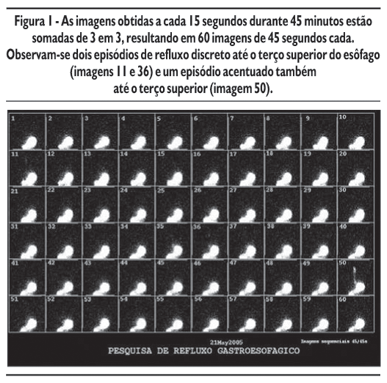OBJECTIVE: To evaluate the benefit of routine pulmonary imaging with a five hour delay in gastroesophageal reflux scintigraphy (GERS) to detect pulmonary aspiration. METHODS: 755 cases were analyzed (400 men, 355 women) within a wide range of age (1 month up to 94 years, mean of 5.2 years). Presence of reflux, its frequency, severity, and esophageal extension were investigated. Delayed pulmonary images assessed the presence of radioactivity in the lungs. RESULTS: 307 cases of gastroesophageal reflux were identified, 84 of which with just one episode, 51 with 2 episodes, 45 with 3, 37 with 4, 18 with 5, and 72 with more than 5. Concerning severity of these 307 cases 22 had no evaluation, 179 were mild, 69 intermediate, and 37 severe. Degree of esophageal extension was not recorded for 6 cases; in 46 cases reflux covered the lower third of the esophagus, in 83 cases it reached the central third, in 161 the upper third, and in 11 cases it extended to the mouth. Delayed pulmonary images were available in 753 cases and none showed signs of lung aspiration. CONCLUSIONS: Delayed pulmonary images were negative in all cases regardless of the patients' age or severity of the disease. This is suggestive that either lung aspiration is rare in GERS procedures or delayed pulmonary imaging has a sensitivity that is too low to permit detection.
Scintigraphym Reflux; Aspiration; Lung; Gastroesophageal; Gastroesophageal reflux


